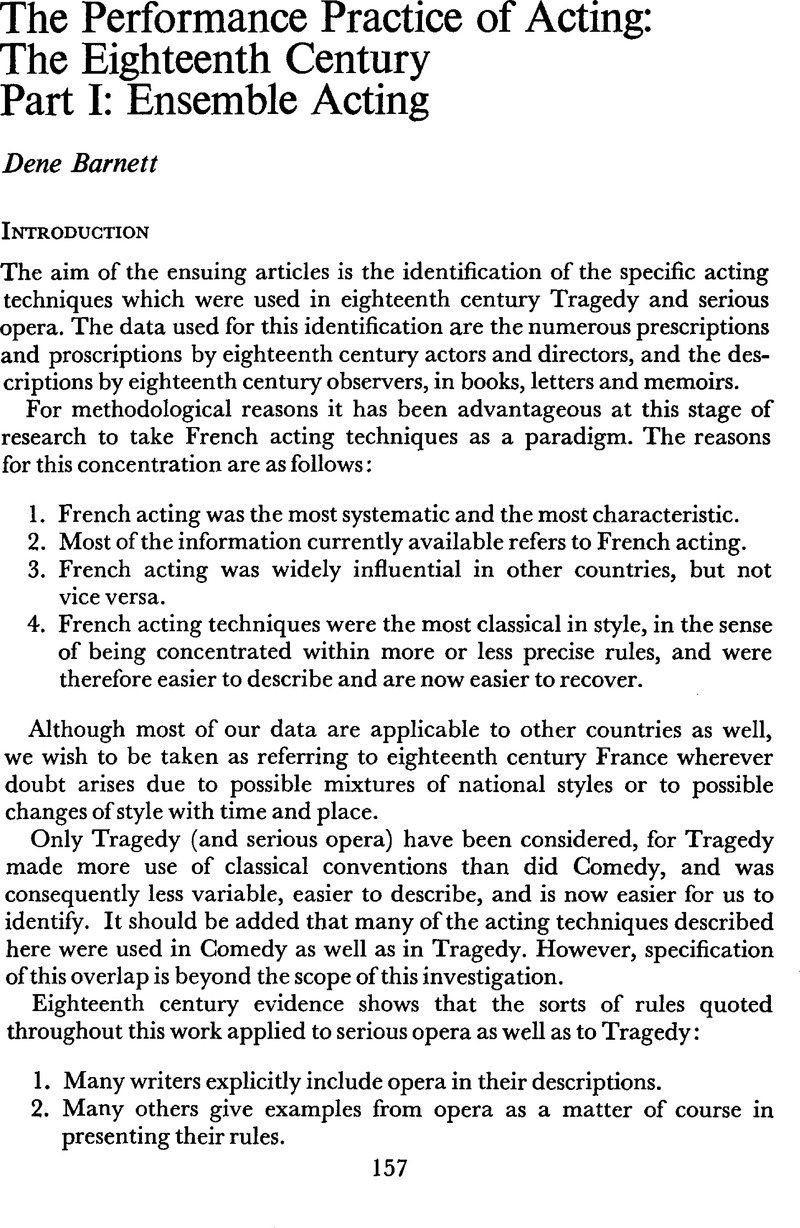Published online by Cambridge University Press: 23 January 2009

1. The research on which these reports are based was financed by the Flinders University oi South Australia and by the Australian Research Grants Committee.
A much appreciated contribution was made to this research by my research assistant Jeanette Massy-Westropp, for whose extensive and judicious help I am grateful. I also wish to acknowledge the assistance of Penelope Browell and Edith Lack, and Carole Atkins for expert typing. Assistance with translations was given by Lolo Schoevers, Wendy Reid and H. Castle.
2. Agricola, Johann Friedrich, Anleitung zur Singkunst (Berlin, 1727), p. 216Google Scholar
3. Riccoboni, François, L'Art du Théâatre (Paris, 1750).Google Scholar
4. Albine, Pierre Rémond de Sainte, Le Comédien (Paris, 1747).Google Scholar
5. See Wolff, H. C., Die Händel-Oper auf der modernen Bühne (Liepzig, 1957), p. 29Google Scholar; see also: Dene Barnett, The Performance Practice of Acting, 18th Century Serious Opera, forthcoming.
6. Jelgerhuis, Johannes, Theoretische Lessen over de Gesticulatie en Mimiek… (Amsterdam, 1827).Google Scholar
7. Austin, Gilbert, Chironomia; or a Treatise on Rhetorical Delivery:… (London, 1806).Google Scholar For English sources in general see English Theatrical Literature, 1559–1900: a Bibliography… by Arnott, J. F. and Robinson, J. W. (London, 1970).Google Scholar
8. It is relevant that Jelgerhuis's fine paintings, several of which now hang in the Rijkmuseum, Amsterdam, show no trace of the Romanticism which was then sweeping France and Germany.
9. op. cit.
10. op. cit.
11. von Goethe, Johann Wolfgang, ‘Regeln für Schauspieler’ 1803. (See Goethes Werke. Weimar, 1887–1919, Abt. l, Bd. 40).Google Scholar
12. Schröder, Friedrich Ludwig, Anton Franz Riccoboni's and Friedrich Ludwig Schröder's Vor-schriften über die Schauspielkunst (Leipzig, 1821).Google Scholar
13. Tutte le opere di Pietro Metastasio, Vol. III, Lettere. (Mondadori, ed., 1951).Google Scholar
14. Böttiger, Karl August, Entwwkelung des Ifflandischen Spiels in vierzehn Darstellungen auf dem Weimarischen Hoftheater in Aprillmonath 1796. (Leipzig, 1796).Google Scholar
15. A valuable exception is the set of highly accurate engravings of the Schouwburg in the Toneelmuseum, Amsterdam. I am indebted to the director, E. Alexander, for information and discussion about these sources.
16. Other sources whose further systematic exploration will yield useful information are word-books, opera scores and libretti with marginal stage directions, archives from schools of acting and declamation, and numerous types of books which contain isolated pieces of information about acting but whose titles give no indication thereof, and which are therefore likely to remain unexplored by theatre historians.
17. We are indebted to the following libraries for photocopies of some of the sources used in this article: Bibliothèque de l'Arsenal, Paris; Bibliothèque-Musée de l'Opéra, Paris; Bibliothèque Nationale, Paris; The British Library, London; The Library of Congress, Washington; The New York Public Library, N.Y.; The State Library of South Australia, Adelaide; Universiteitsbibliotheek, Amsterdam; Yale University Library, New Haven; Theatermuseum, fruher Clara Ziegler-Stiftung, Munich; Toneelmuseum, Amsterdam.
18. The general significance of Lang's work and that of many others used in this research, is described in Theatergeschichte Europas by Kindermann, Heinz, Vols. III and IV (Salzburg, 1967 & 1972).Google Scholar
19. See Goethe's letter to Zelter of 3rd May, 1816 in Goethes Werke, Weimar, 1887–1919, Abt. 4, Bd. 27.
20. See Goethes Werke, Weimar 1887–1919, Abt. 1, Bd. 35, Tag-und Jahres-Hefte, 1803.
21. The French and Italian translations are by Jeanette Massy-Westropp.
22. This passage was repeated verbatim in The History of the English Stage, Betterton, Thomas, (London, 1741). p. 96.Google Scholar